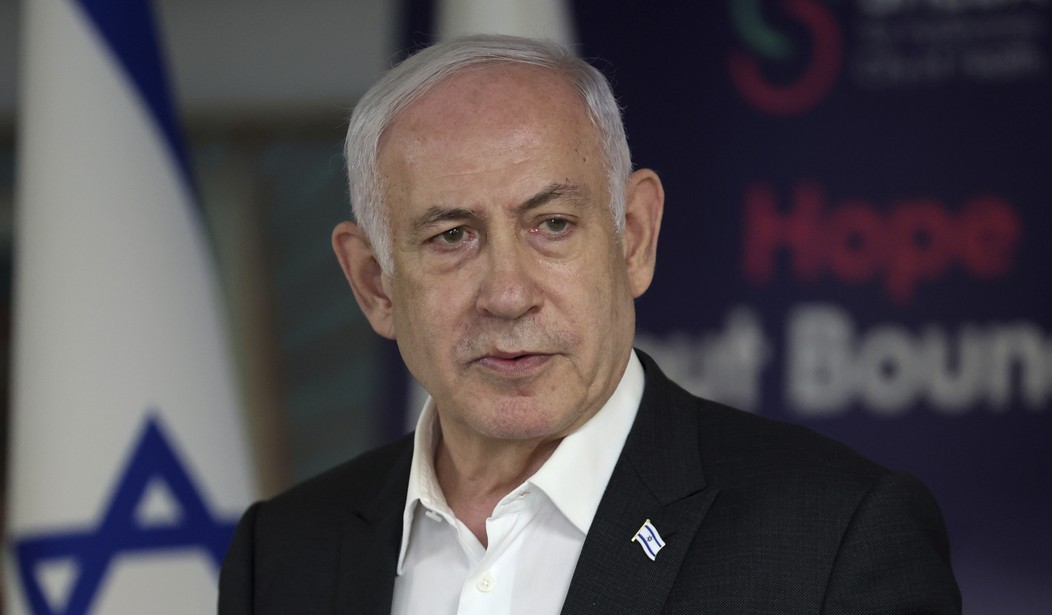Benjamin Netanyahu just told hostage families and their supporters the unvarnished truth. Will that spell the end of his career? And will it spell the end of Hamas and the incentives for hostaging?
Netanyahu has to know he's risking the former by attempting the latter. In the most direct remarks yet about his policy in the October 7 war, Netanyahu has told Israelis that the country's strategic necessities outweigh the hostages Hamas holds:
"I am not sure that there will be a [hostage] deal," Prime Minister Benjamin Netanyahu told the Valor Forum - a group of families who have lost loved ones in the Israel-Hamas war, at a meeting Tuesday, the forum said.
The forum includes 150 families, and its goal is to "continue the mission started by their loved ones" by strengthening the government in the war against Hamas. The forum also strives to "support the continuation of the fighting in spite of foreign pressure and ensure that no one stops the mission of defeating [the enemy] in the middle."
"If there is a deal, it will be such that guards the interest that I repeat again and again, which is guarding Israel's strategic assets," Netanyahu added.
Clearly, Netanyahu has as much skepticism as Jazz does about Hamas' supposed acceptance of the deal. They want to draw out negotiations for as long as possible to get the US to force Israel into more concessions. However, Netanyahu now seems to be gaining more confidence in being able to negate Hamas' leverage on hostaging ... after twenty years of helping to inflate its value.
It doesn't help that the IDF keeps finding hostages dead:
The Israeli army said on Tuesday it retrieved the bodies of six hostages from Gaza's southern area of Khan Yunis in a joint operation with internal security agency Shin Bet.
The hostages were Yagev Buchshtab, Alexander Dancyg, Yoram Metzger, Nadav Popplewell, Chaim Perry, previously announced dead, and Avraham Munder, whose kibbutz of Nir Oz near Gaza announced his death earlier Tuesday.
That does not impact leverage as much as some might think. The Israelis set a high value for the return of remains of those killed by Hamas; they hold a few remains from previous conflicts going back more than a decade, in fact. In the past, the Israelis have made hostaging a very valuable tactic for Hamas with lopsided trades of Palestinian prisoners. In the most infamous of these, Israel released more than a thousand prisoners for one soldier, Gilad Shalit, a trade that included Yahya Sinwar, the author of the Al-Aqsa Flood Operation on October 7 that cost 1200 Israeli lives.
The impulse to trade almost anything for hostages is what has kept pressure on Netanyahu to negotiate with Hamas. As I wrote at the beginning of the war, the Israelis would have to decide at some point whether to choose hostages or survival, because Hamas has made clear that it intends to destroy Israel no matter what. Netanyahu has apparently made that decision, and for a real strategic purpose. He wants to ensure that Hamas cannot survive the war, and to do so, the IDF will have to cut off its lines of communication for good:
Israel stood firm on its insistent that the IDF must retain a military presence in the Philadelphi Corridor after Prime Minister Benjamin Netanyahu met with US Secretary Antony Blinken in Jerusalem to discuss how to advance the hostage negotiations.
“The Prime Minister stands firmly by the principle that the IDF will physically remain on the Philadelphi Corridor that borders with Egypt to prevent the resupply of Hamas’s deadly weapons, “ government spokesperson David Mercer told reporters in Jerusalem.
Hamas will never agree to that, not even as a temporary measure. That would cut off their support and leave them exposed to be picked off over the long term. They wouldn't even have the resources to keep their political grip on Gaza, let alone conduct their genocidal war against the Israelis. Netanyahu's position means the destruction of Hamas at some point, and everyone knows it. He's playing to win this time, not just to reset a frozen conflict.
Is that worth more than the lives of however many hostages remain alive? Not to their families, of course. And understandably so; if my family member or friend was among those held by Hamas, I'd want the government to do whatever was necessary to get them out. In fact, that's still a very good point about the American government Joe Biden took credit for the late November pause and hostage swap, but didn't demand the release of Americans held at that time. (One American, a toddler, got released in a bonus swap at the end.)
However, Netanyahu has broader responsibilities, especially the survival and security of Israel and all of its citizens and residents. While Hamas operates in Gaza, none of them are safe, and as long as Israel keeps paying Danegeld for hostages, Hamas will keep abducting them for Israeli concessions. The only way to end that is to eliminate the incentives for hostaging -- and that's what Netanyahu's doing now, albeit still not quite explicitly.
Are Israelis ready for that kind of hard truth and tough policy? It will break hearts, but necessarily so. If the last twenty years taught the Israelis anything, it's the futility of negotiating with terrorists who are determined to destroy them. It clearly hasn't taught us that lesson, but the Israelis may be ready to finally face the harsh reality and the necessity of finishing this job once and for all.








Join the conversation as a VIP Member